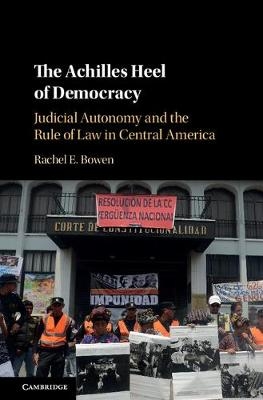
The Achilles Heel of Democracy
Judicial Autonomy and the Rule of Law in Central America
Seiten
2017
Cambridge University Press (Verlag)
978-1-107-17832-8 (ISBN)
Cambridge University Press (Verlag)
978-1-107-17832-8 (ISBN)
Comparing five Central American countries, this book explores the influences of criminals, activists, and other societal actors on the justice system. The role of the judiciary in promoting the rule of law is of interest to political science and legal scholars. This work with its focus on Central America will be of particular interest.
Featuring the first in-depth comparison of the judicial politics of five under-studied Central American countries, The Achilles Heel of Democracy offers a novel typology of 'judicial regime types' based on the political independence and societal autonomy of the judiciary. This book highlights the under-theorized influences on the justice system - criminals, activists, and other societal actors - and the ways that they intersect with more overtly political influences. Grounded in interviews with judges, lawyers, and activists, it presents the 'high politics' of constitutional conflicts in the context of national political conflicts as well as the 'low politics' of crime control and the operations of trial-level courts. The book begins in the violent and often authoritarian 1980s in Guatemala, El Salvador, Honduras, and Nicaragua, and spans through the tumultuous 2015 'Guatemalan Spring'; the evolution of Costa Rica's robust liberal judicial regime is traced from the 1950s.
Featuring the first in-depth comparison of the judicial politics of five under-studied Central American countries, The Achilles Heel of Democracy offers a novel typology of 'judicial regime types' based on the political independence and societal autonomy of the judiciary. This book highlights the under-theorized influences on the justice system - criminals, activists, and other societal actors - and the ways that they intersect with more overtly political influences. Grounded in interviews with judges, lawyers, and activists, it presents the 'high politics' of constitutional conflicts in the context of national political conflicts as well as the 'low politics' of crime control and the operations of trial-level courts. The book begins in the violent and often authoritarian 1980s in Guatemala, El Salvador, Honduras, and Nicaragua, and spans through the tumultuous 2015 'Guatemalan Spring'; the evolution of Costa Rica's robust liberal judicial regime is traced from the 1950s.
Rachel E. Bowen is an Assistant Professor of Political Science at Ohio State University, where she teaches courses on comparative politics, American politics, constitutional law, and gender and politics. She has been researching Central America since 2002.
1. Societally penetrated judiciaries and the democratic rule of law; 2. The evolution of judicial regimes; 3. Costa Rica: a liberal judicial regime; 4. Government control regimes in Central America versus the rule of law; 5. Clandestine control in Guatemala; 6. Partisan systems; Conclusion.
| Erscheinungsdatum | 22.06.2017 |
|---|---|
| Zusatzinfo | Worked examples or Exercises |
| Verlagsort | Cambridge |
| Sprache | englisch |
| Maße | 158 x 235 mm |
| Gewicht | 550 g |
| Themenwelt | Recht / Steuern ► Allgemeines / Lexika |
| Recht / Steuern ► EU / Internationales Recht | |
| Recht / Steuern ► Öffentliches Recht | |
| Sozialwissenschaften ► Politik / Verwaltung ► Politische Systeme | |
| ISBN-10 | 1-107-17832-0 / 1107178320 |
| ISBN-13 | 978-1-107-17832-8 / 9781107178328 |
| Zustand | Neuware |
| Haben Sie eine Frage zum Produkt? |
Mehr entdecken
aus dem Bereich
aus dem Bereich
über Alltagsorte des sozialen Zusammenhalts
Buch | Softcover (2024)
transcript (Verlag)
24,00 €


